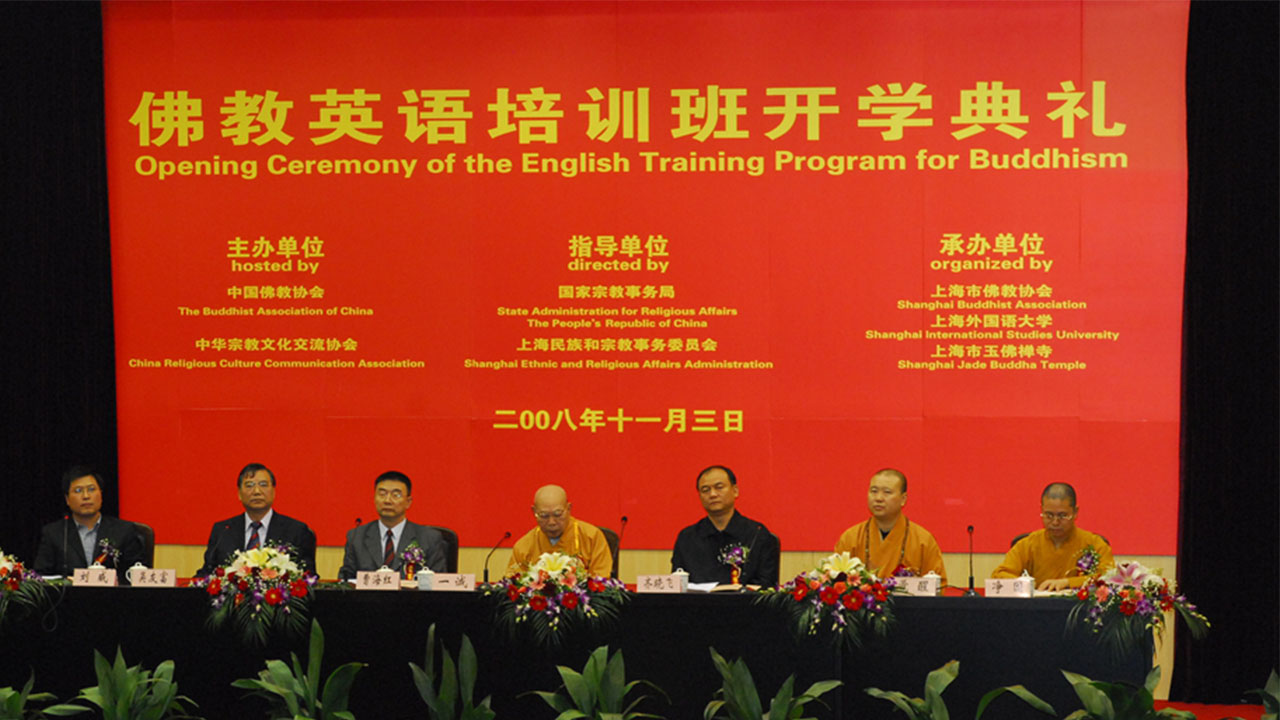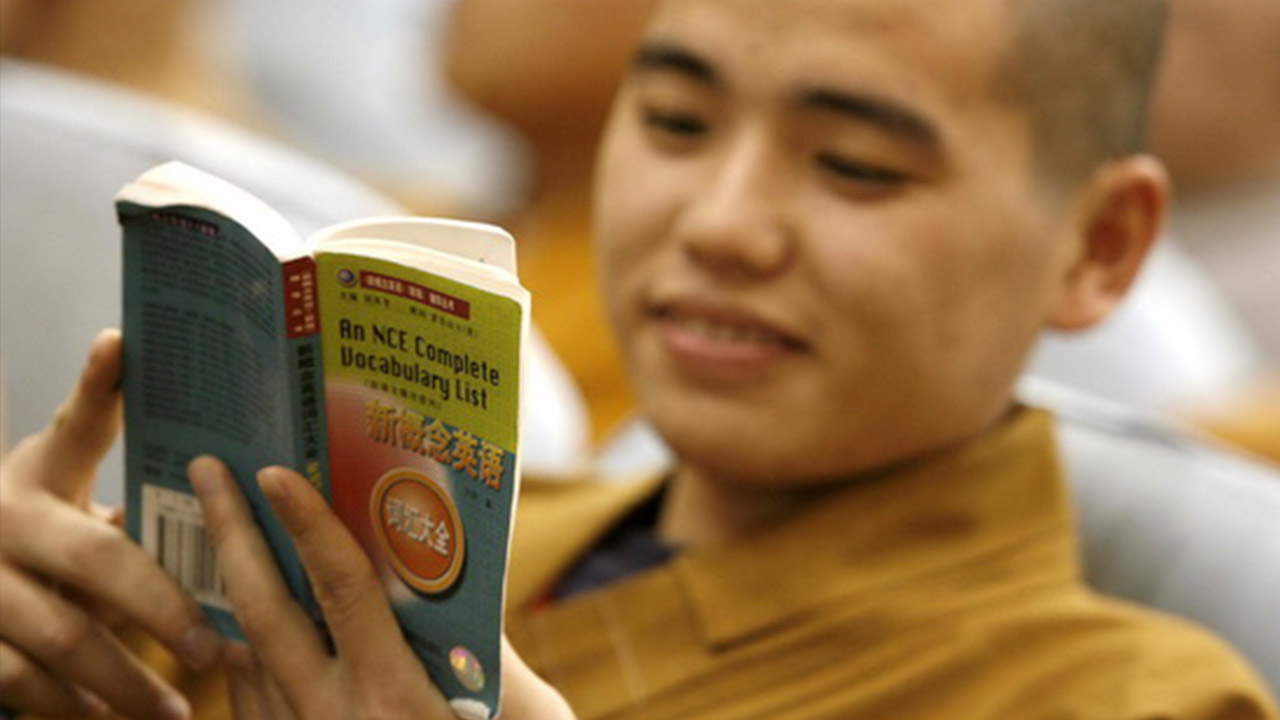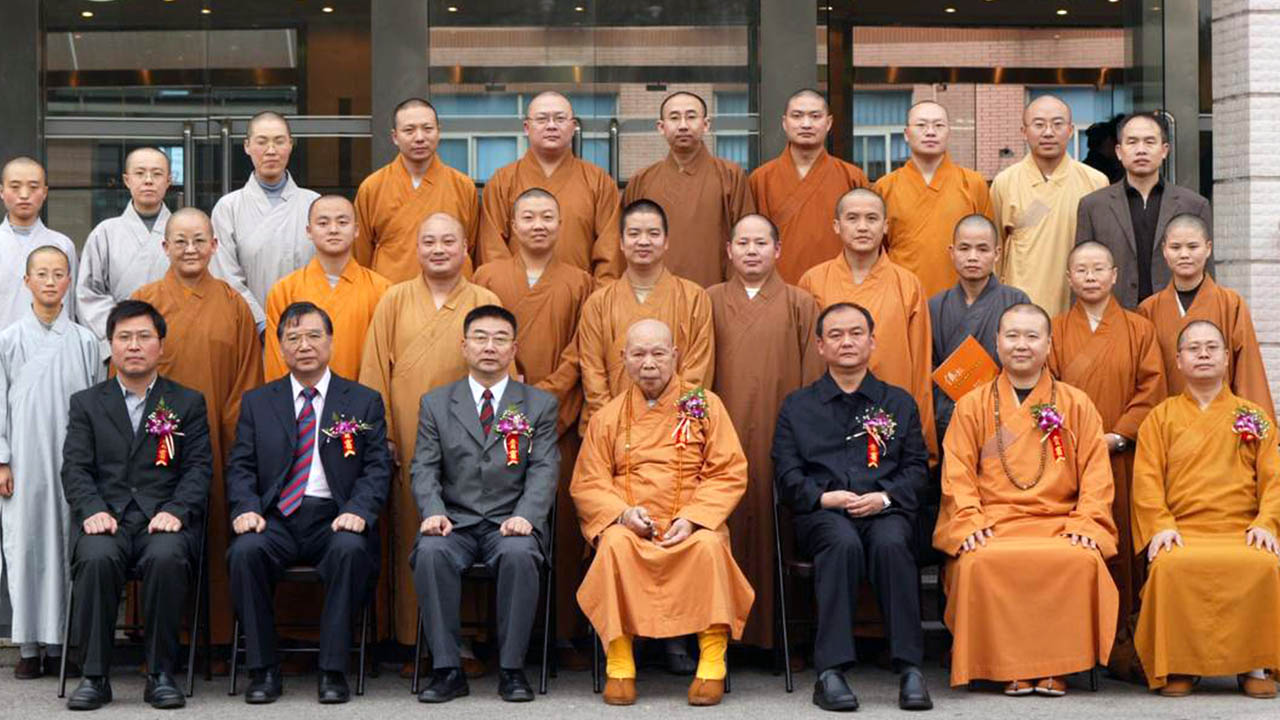| T |
en musician monks from the Shanghai Jade Buddha Temple orchestra have started a new trend for Buddhist monks - they are now studying at the Shanghai Theatre Academy and the Shanghai Conservatory of Music. They began attending classes in last September and, for the next three years, they will be learning singing, music theory, acting and directing.
"We are not professional performers but we hope to learn from professionals how to perform our music better so that we can advance Buddhism," explained Sheng Jing, one of the monks. He said the sole purpose of the exercise was to help them promote Buddhism and their charitable works.
The orchestra was officially established in 2000 and the conductor is Master Jue Xing, who became the abbot of the Shanghai Jade Buddha Temple in November 1999. He has been keen to advance Buddhism using modern techniques and education. "Society is developing and Buddhism has to inherit, develop and innovate as well. Only in this way can we achieve social cohesion and universal salvation," he said.
The orchestra and its performances are a key part of the temple's work. For the past 15 years, the orchestra has performed in China and abroad, presenting Buddhist music and performing shows using traditional instruments. They have adapted classical Buddhist poetry and set music to it and they have created little pieces of theater and dance to illustrate Buddhist stories and legends.
Earliest days
Buddhism began in India around 6 BC and music became an element in the religion from its earliest days. "Monks chanted the scriptures and developed special rhythms and these are the origins of Buddhist music, the mantras," Sheng Jing explained.
He said Buddhists believed music enhanced a person's spirituality and was a good way to revere the Buddha. "Buddhism was introduced to China during the Han Dynasty (206BC-AD220) and over the following years, it spread and became mixed with Chinese culture. In China the Buddhist mantras were called fanbai which means the chants of monks and they were regarded as holy and tranquil."
Realizing that music made it easier for ordinary people to practice Buddhism, Chinese Buddhists have tried to involve music in their religion from early days, Sheng Jing said.
Today styles of music have become very diverse and music plays a more important role in people's lives. Some of the Buddhist temples in China have created their own orchestras and the Shanghai Jade Buddha Temple has one of the leading Buddhist musical groups in the country. It is a musical group that has changed the lives of many of the monks - some of whom had never been involved with music before.
Ming Fei became a monk when he was 13. Now 34 he joined the Shanghai Jade Buddha Temple in 2001 and then started to learn the xiao (vertical flute) and the dizi (transverse flute) alongside other young monks.
Their teacher was Mao Yulong, a flutist from the Shanghai Conservatory of Music. "He came to the temple regularly and taught us how to play these instruments," Ming Fei said.
Peaceful feeling
"At the temple, monks can learn different instruments Iike the guzheng (the traditional Chinese zither), the yangqin (dulcimer) or drums. I chose the xiao and dizi because I love the sound they make. They are very graceful and melodic and spread a peaceful feeling."
"Our abbot, Master Jue Xing, encouraged young monks to join the orchestra, so we had opportunities to learn musical instruments," Ming Fei said.
There are more than 100 monks at the temple and they lead a disciplined and regulated life. "We get up at 5 am and from 5:30 am to 6:30 am we do morning class together at the Mahavira Hall. Then we have breakfast. From 8 am, we monks start our daily chores. Everyone has a different job to do. Some are on duty in the chapels, some chant sutras for people, and others work in the orchestra or promotions department," Ming Fei said. When he is not busy he fits in time to practice.
In July when he heard that the temple would send 10 monks to be trained in music and performing arts he immediately applied to be chosen. After auditions in which he had to show his skills as a performer, singer and musician he, Sheng Jing and eight other monks were accepted for training at the conservatory and the Shanghai Theatre Academy.
Their studies have added to the chores at the temple. Now they have to rehearse their singing before breakfast and, after the morning class, they undertake another half hour of practice.
"From Monday to Friday, we have a full schedule at the conservatory and academy," Ming Fei said. "In this first semester, we are studying some basic principles like music theory, music appreciation, singing and acting. Later we will study directing and opera."
Challenging study
Ming Fei said the courses were challenging especially in the individual classes they have with their teachers. "In these one-to-one classes the teachers can tell immediately whether we have practiced enough and improved and they can tell us off. There is no way we can goof off."
He is enjoying being a student again. "Going to the classes is a different feeling from having a teacher come to the temple to train us. The facilities are professional and the atmosphere lets us concentrate on our work. Even though it has only been two months since we started I can feel the improvement."
When the Global Times visited the temple, Ming Fei, Sheng Jing and some other monks and lay enthusiasts were rehearsing for a performance planned for Shaoxing, Zhejiang Province, in late November.
The temple's performance team are usually just musicians, singers and some dancers but other temple devotees often join in to form larger choirs and dance groups. Wang Honghua is a senior member of the dance ensemble. The 48-year-old woman has been a Buddhist for 20 years and came to the Jade Buddha Temple in 2006 where she first joined the orchestra but later learned movements and moved to the dance group.
"These big performances need a lot of people and a different style of performing. We want to help where we can," said Wang, who said her involvement reflected her love for Buddhism.
A special dance
She and a group of women have been practicing a special dance dedicated to Guanyin, the goddess of mercy and compassion. The dance illustrates in movement how the goddess can assume many guises and how she relieves suffering.
"If onlookers don't know about Buddhism, but find themselves moved and understanding something of Buddhism from our dancing we will be very happy."
Wang said that over the years she has performed with the temple orchestra and dancers several times, usually at festivals or for charity events. Most of the lay dancers and musicians worked full time and rehearsed on Sundays unless there was a special performance planned when the performers would practice on nights throughout the week.
Ding Zhiqian is an executive director with an international tax and business advisory services company in Shanghai, and in February she and other enthusiasts set up a temple choir which now has 76 members.
"We wanted to connect the two things - Buddhism and choral singing," Ding explained. "In Christianity, it's common to see choirs sing about their religion but we don't have this tradition in Buddhism. However choirs are a great way for people to participate in their religion and to express the way they feel about Christianity. So we are doing this for Buddhism."
The temple choir has the full support of Master Jue Xing, the abbot, and like the dancers, none of the choristers gets paid - in fact choir members pay 2,000 yuan ($326) a year in fees and all invest a lot of their own time in the performances.
The choir began taking shape after Wang Tielong, who is the secretary-general of the professional committee for choirs with the Shanghai Musicians' Association, joined as the conductor. "Christianity has hundreds of years of creating hymns but there is barely anything in Buddhism. Wang helped us transpose some Buddhist songs for the choir," Ding said.
Apart from the new choral works, many leading Chinese musicians have been contributing to the development of contemporary Buddhist music. Zhang Jinting, a leading Buddhist music composer from Xiamen, Fujian Province, told the Global Times, he has composed more than 360 pieces of Buddhist music to date.
Sheng Jing admitted there was still some controversy about the monks performing. "Some people don't like seeing monks onstage. Some still believe monks should live in isolation from society.
"But unlike other temples on mountains or in suburbs, the Shanghai Jade Buddha Temple is near the center of the city. It is a place that can bring peace to people. But to help people we have to understand them and to understand them, we have to be close to the society they live in and use the ways ordinary people communicate to help them understand Buddhism."
Other studies
Sheng Jing said the training of the monks at professional institutions was only one part of the way the temple was modernizing its approach. Before it had decided to send monks to study music and drama, it had sent monks to study English, French, German, Japanese and Korean at the Shanghai International Studies University (SISU) and others to MBA courses at the Shanghai Jiao Tong University. Some monks had even gone to the US to complete their master's degrees.
The abbot, Master Jue Xing, is obviously open-minded and far from the image of a distant aloof man of religion. He has even appeared in one of the temple performances himself at a special event commemorating the birth of Buddha.
Wu Jingyun is an employee of the temple and an orchestra member. She was a school music teacher and a volunteer player in the orchestra for many years but now has been signed on to work full time to help the orchestra.
She said the temple was looking for more people to help with the music and performances. "We need performers, writers, directors, musicians and dressers. Buddhism is very tolerant and we welcome anyone including foreigners. You will be intrigued when you hear Buddhist music or see a Buddhist play."






